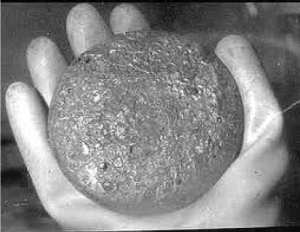On Dec. 19, 2020, Archbishop John Wester of Santa Fe held a blessing ceremony and unveiling of a sign of peace at the Shrine of our Lady of Guadalupe in Santa Fe, which declares, La poseer las armas nucleares es immoral. “The possessing of nuclear weapons is immoral.” He called for difficult conversations to be held and continues to speak about the need for global nuclear disarmament. Pope Francis declared in 2019, “The use of atomic energy for purposes of war is immoral, just as the possession of atomic weapons is immoral. We will be judged on this.”
Here in Northern New Mexico, Los Alamos National Laboratory (LANL) has plans to expand its missions to include industrial-scale plutonium pit production and other plutonium missions with a multi-billion dollar price tag. Plutonium pits are a key component in triggering the nuclear explosion of thermonuclear weapons. A “pit” is required for each nuclear warhead to detonate its payload “effectively.”
Here are a few of many facts about the United States nuclear weapons enterprise:
The Obama, Trump, and now Biden administrations have all mandated the “modernization” of the entire US nuclear weapons arsenal based in part on assertions that the “pits” are getting too old.
Research shows that plutonium pits have reliable lifetimes of at least 80 years, maybe more- The oldest pit in the arsenal is forty-three years old. The US has tens of thousands of usable pits in storage at the Pantex plant in Texas, and thousands of usable warheads, enough to destroy all life on earth hundreds of times over; therefore it is not clear why rebuilding pits is actually necessary.
LANL is tasked with building one War Reserve plutonium pit in 2023, at least 10 in 2024, and 20 in 2025, with full-blown production commencing in 2026 of at least 30 pits per year for at LANL with surge capacity of up to 80 pits per year.
According to a December 2021 report written by Los Alamos Study Group (LASG ) a US Congressional Budget Office (CBO) 2017 report estimated the modernization’s 30-year US nuclear weapon costs, including environmental costs, would expand to US $1.92 trillion.
LANL needs workers to build new infrastructure, manufacture the pits, related plutonium handling tasks and cleanup the new radioactive and hazardous waste. Plans are in place for Northern New Mexico youth to play a key role in building the infrastructure LANL needs to get to pit production. According to a 2020 LANL press release, the New Mexico Building and Construction Trades Council, and LANL have partnered with the Taos and Questa Municipal School Districts to create building trades courses for high school students. These courses are designed to funnel students directly to LANL to work full-time as paid apprentices, after which they will be employed as well-paid journeyman workers at LANL.
Taking this to mind, here are questions to be thought about, researched, and discussed per Archbishop Wester’s urging:
- Are nuclear weapons immoral?
- Does the US need almost 4,000 nuclear weapons?
- Is this multi-billion dollar “modernization” necessary for our national security and safety?
- What do today’s youth know about nuclear war?
- As students enter this vocational training, are they being told that they are being prepared for jobs that support, house, make, and maintain nuclear weapons?
- What are the types of jobs that students will be trained for that involve cleaning up radioactive and hazardous waste generated by plutonium pit production and associated plutonium activities? The Cold War-era pit production facility at Rocky Flats, Colo. was permanently closed in 1992 and continues to be a Superfund site due to plutonium contamination.
- Are people aware of the enormous amounts of electricity and New Mexico’s dwindling water resources that LANL needs for its expanding plutonium missions?
We can also ask ourselves:
- Do nuclear weapons jobs contribute to the greater good of the community and a resilient future?
- Can we consider different measure where the skills and gifts of devotion we bring to our communities through vocations and actions nurture, regenerate, and sustain all of life?
- What kinds of educational programs could be fostered in the 21st Century as we are increasingly experiencing the vulnerabilities of today’s economic paradigm?
- Can we shift at the local level from today’s extractive economy where prosperity is measured by Gross Domestic Product, growth, and mass consumerism and create a new paradigm that is distributive, regenerative, and resilient, and where all can thrive within the means of our life-giving planet?
How we answer these questions could determine the future of today’s youth and coming generations in Northern New Mexico.
For more info: contact Suzie Schwartz
Norteños for Peaceful and Resilient Futures
(575) 770-2629; eototos@gmail.com



